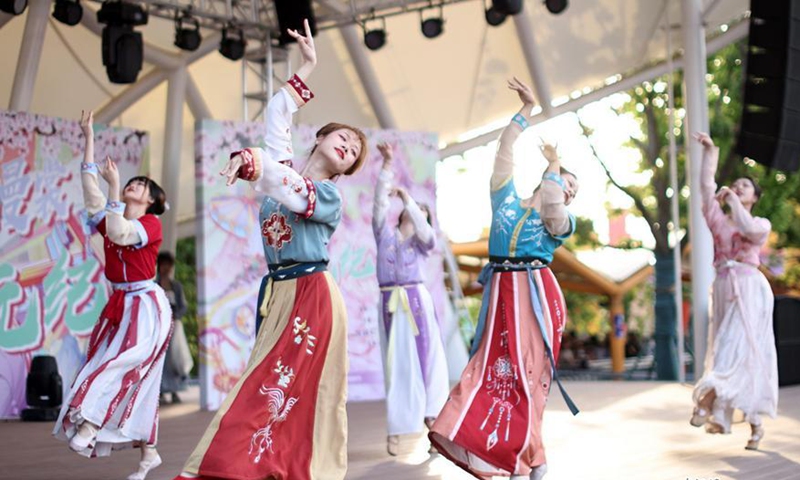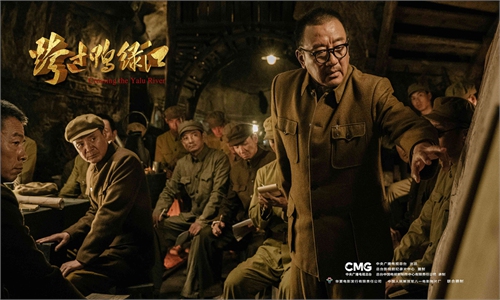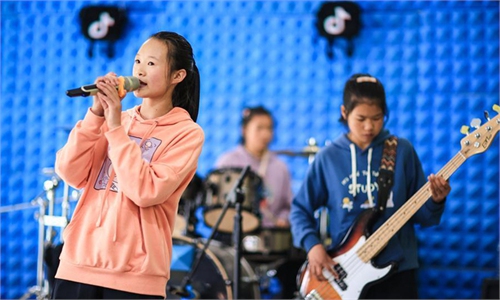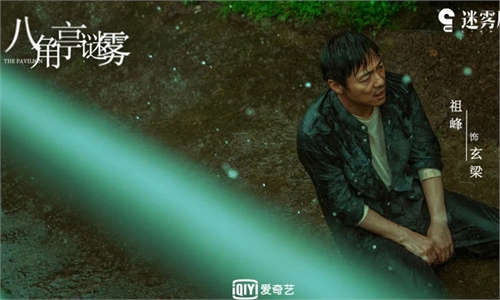
People wearing Traditional Chinese Costumes Hanfu perform at Nanjing Happy Valley in East China's Jiangsu Province, May 1, 2021. (Photo/China News Service)
Franchised amusement park Nanjing Happy Valley recently posted an apology on Sina Weibo in response to a controversial "ghost house" event that netizens say violated the image rights of Peking Opera actors and insulted the Chinese Opera culture.The apology came after the park held a "scary dream in pear garden" event, a ghost hunting-themed activity that the park specially designed to attract visitors around the Halloween season. However, the event raised the ire of netizens who noticed that it used distortedly edited photos of Chinese Peking Opera masters such Li Shengsu, Chi Xiaoqiu and Ding Xiaojun.
Some netizens pointed out that the promotional posters the park revealed in mid-October that China's leading Peking Opera artist Li Shangsu's image appears although creepy filters had been added to make her appear like a ghost.
"It [the Happy Valley] could face a 'double infringement' if the artist's face can be distinguished even with the makeup. It then faces infringement of image rights. Also, if the photo was a shot directly took from the 'look' that the artist used in a particular play, then it could be infringing on the rights of that play's author," Xu Xinming, a law expert told the Global Times.
Netizens on Sina Weibo demanded that the offending pictures be removed.
"Our company immediately launched an investigation and confirmed the violation," Nanjing Happy Valley posted on its Sina Weibo account on Sunday.
Nanjing Happy Valley specified in its apology that content related to the project has been deleted from their promotional platforms, while the event has been shut down awaiting rectification.
Despite the apology, some netizens called on Happy Valley to permanently ban the event because it insults Peking Opera, considered by many to be China's most precious cultural essence.
"As our national cultural essence, I hate to see Peking Opera been overly 'commercialized,' and used as an element in things that deliver negative messages," Wang Bing, a traditional Chinese opera singer, told the Global Times.
The Nanjing amusement park is not the only entertainment company that has tied Chinese opera with scary supernatural activities.
The "scary dream in pear garden" theme has also been used as the background for popular escape rooms in Ningbo and Tongxiang in East China's Zhejiang Province.
"The groups are mainly young people… It is our creepiest project but not a bloody one. The opera elements are there to make your back shiver," a customer service representative of the Ningbo shop described the role playing activity to the Global Times on Tuesday.
"The art form is not very well known by people nowadays, so it shouldn't be further misunderstood by them," added Wang.
"Such ghost themed entertainment activities need to be more strictly regulated, especially their content and ideologies," posted a netizen on Sina Weibo.
The 'scary dream in pear garden' script was inspired by one of the repertoires, A Walk in the Garden, from the well-known Chinese romance tragedy play The Peony Pavilion written by Tang Xianzu, a Ming Dynasty (1368-1644) playwright.



